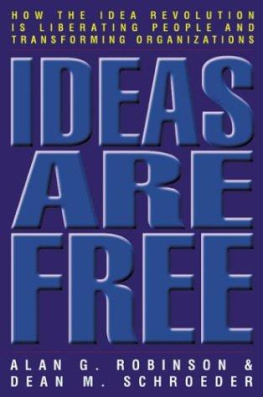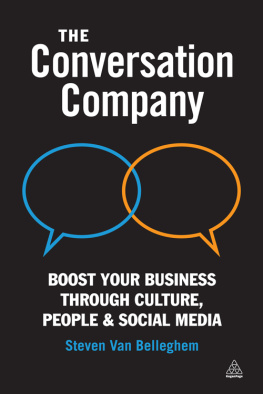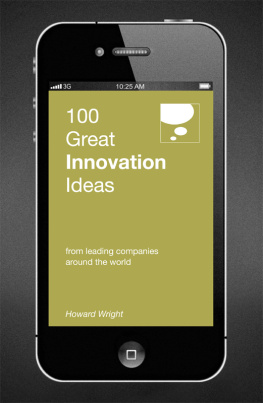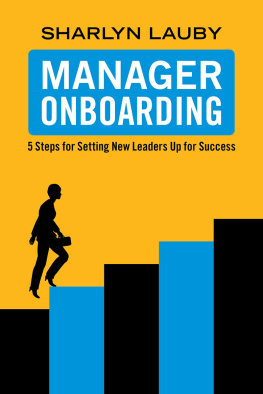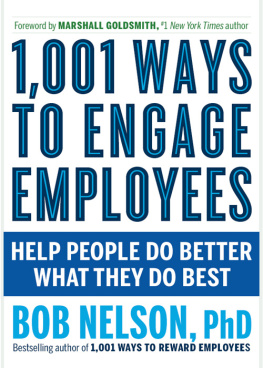Ideas are FreeHow the Idea Revolution Is Liberating People and Transforming Organizations
Alan G. Robinson
Dean M. Schroeder
Copyright 2004 by Alan G. Robinson and Dean M. Schroeder
All rights reserved. No part of this publication may be reproduced, distributed, or transmitted in any form or by any means, including photocopying, recording, or other electronic or mechanical methods, without the prior written permission of the publisher, except in the case of brief quotations embodied in critical reviews and certain other noncommercial uses permitted by copyright law. For permission requests, write to the publisher, addressed Attention: Permissions Coordinator, at the address below.
Berrett-Koehler Publishers, Inc.
235 Montgomery Street, Suite 650
San Francisco, CA 94104-2916
Tel: (415) 288-0260
Fax: (415) 362-2512
www.bkconnection.com
ORDERING INFORMATION
Quantity sales. Special discounts are available on quantity purchases by corporations, associations, and others. For details, contact the Special Sales Department at the Berrett-Koehler address above.
Individual sales. Berrett-Koehler publications are available through most bookstores. They can also be ordered direct from Berrett-Koehler: Tel: (800) 929-2929; Fax: (802) 864-7626; www.bkconnection.com
Orders for college textbook/course adoption use. Please contact Berrett-Koehler: Tel: (800) 929-2929; Fax: (802) 864-7626.
Orders by U.S. trade bookstores and wholesalers. Please contact Publishers Group West, 1700 Fourth Street, Berkeley, CA 94710. Tel: (510) 528-1444; Fax (510) 528-3444.
Production Management: Michael Bass Associates
Berrett-Koehler and the BK logo are registered trademarks of Berrett-Koehler Publishers, Inc.
Printed in the United States of America
Berrett-Koehler books are printed on long-lasting acid-free paper. When it is available, we choose paper that has been manufactured by environmentally responsible processes. These may include using trees grown in sustainable forests, incorporating recycled paper, minimizing chlorine in bleaching, or recycling the energy produced at the paper mill.
Library of Congress Cataloging-in-Publication Data
Robinson, Alan (Alan G.) Ideas are free: how the idea revolution is liberating people and transforming organizations / Alan G. Robinson, Dean M. Schroeder. p. cm. Includes bibliographical references and index. ISBN 1-57675-282-8 1. Suggestion systems. 2. ManagementEmployee participation. 3. Organizational change. 4. Organizational effectiveness. 5. Corporate culture. I. Schroeder, Dean M. II. Title.
HF5.549.5.S8R63 2003 658.3 4dc22 200362804
First Edition 09 08 07 06 05 0410 9 8 7 6 5 4 3 2 1
To Margaret, Phoebe, and Margot
To Kate, Lexie, Liz, and Tori
ABOUT THE AUTHORS
Alan G. Robinson is an award-winning author, an educator, and a consultant. He is co-author of Corporate Creativity, which was a finalist for the Financial Times/Booz Allen & Hamilton Global Best Business Book Award, and was named Book of the Year by the Academy of Human Resource Management. He has a Ph.D. from the Johns Hopkins WUniversity and a B.A./M.A. from the University of Cambridge. He teaches at the Isenberg School of Management at the University of Massachusetts at Amherst. Dr. Robinson has advised more than a hundred companies and government agencies in eleven countries.
Dean M. Schroeder is the Herbert and Agnes Schulz Professor of Management at Valparaiso University. Prior to entering academe, he founded and led two companies, and as an outside CEO, led the turnaround of a third. He is the author of more than sixty articles and papers, several of which have received national awards. He served for five years on the Board of Examiners of the Malcolm Baldrige National Quality Award and is on the Board of Directors of the American Creativity Association. He has a Ph.D. in Strategic Management and a B.S. in Engineering from the University of Minnesota, and an M.B.A. from the University of Montana. Dr. Schroeder has advised companies all over the world in the management of technology, strategic management, and the management of ideas and change.
For more about how to liberate your people and transform your organization through employee ideas, visit our website at
http://www.ideasarefree.com.
Preface
Performance expectations for managers keep going up. Managers are continually asked to do more, but to do it with less. For top management, the standard response to flagging profits and increasing competition has become budget cuts and layoffs. Middle managers and supervisors suffer the consequences, as they are left with too few resources and people to do the work. They are forced to operate in survival mode, putting in long hours to deal with an endless stream of urgent problems. Almost never do they have the time to think beyond this months results. In addition, they are under constant scrutiny, and their jobs are not secure.
Ironically, help is closer than they realizein the people who work for them. They are the ones who do the work, and they see many things their managers dont. On a daily basis, they see what is frustrating customers, causing waste, or generally holding the organization back. Employees often know how to improve performance and reduce costs more intelligently than their bosses do. Yet they are rarely given a chance to do anything about it. No one asks them for their ideas.
Over the last century, many managers have recognized the huge potential in employee ideas and tried to tap it. But few have been truly successful. Those few found that they had fundamentally changed their organizations and helped them reach extraordinary levels of performance. Today, most managers either dont realize the full power of employee ideas or have never learned how to deal with them effectively. That is why we wrote Ideas Are Free.
The book has its origins in the late 1980s when we both were on the faculty of the University of Massachusetts. Before going into academe, Dean Schroeder had headed a number of organizational turnarounds and major change initiatives, and had learned that the employees of distressed companies could often identify and solve critical problems which management had either missed or ignored. Invariably, they had penetrating insight into the issues that their companies faced and good ideas about how to address them. Why, Dean wondered, had their managers made no use of this free and willing resource?
Around this time, Alan Robinson came to ask the same question. He was studying how leading Japanese companies were managed. Many of them had higher productivity and better products than their Western counterparts, and he wanted to understand why. Through professional contacts and family members living and working in Japan, he was able to gain unusual access to twenty Japanese companies. Alan found that these companies put a great deal of emphasis on something that most Westerners had largely overlooked.
The Japanese managers were asking ordinary employeesthe ones who staffed the offices, worked in the factories, and served the customersfor their ideas. Small ideas. Not creative whiz-bang new product or service ideas, but everyday commonsense ideas that would save a little money or time, make their jobs easier, improve the customer experience, or in some other way make the company better. Some of the companies Alan studied were getting and using extraordinary numbers of ideasin some cases almost one per person per week. And these ideas accumulated into significant competitive advantage.
We both found the concept of seeking employee ideas compellingit was clear how this would lead to high employee involvement and superior performance. Strangely, the vast majority of companies we were familiar with seemed to ignore this huge opportunity. Most of them were far better at

